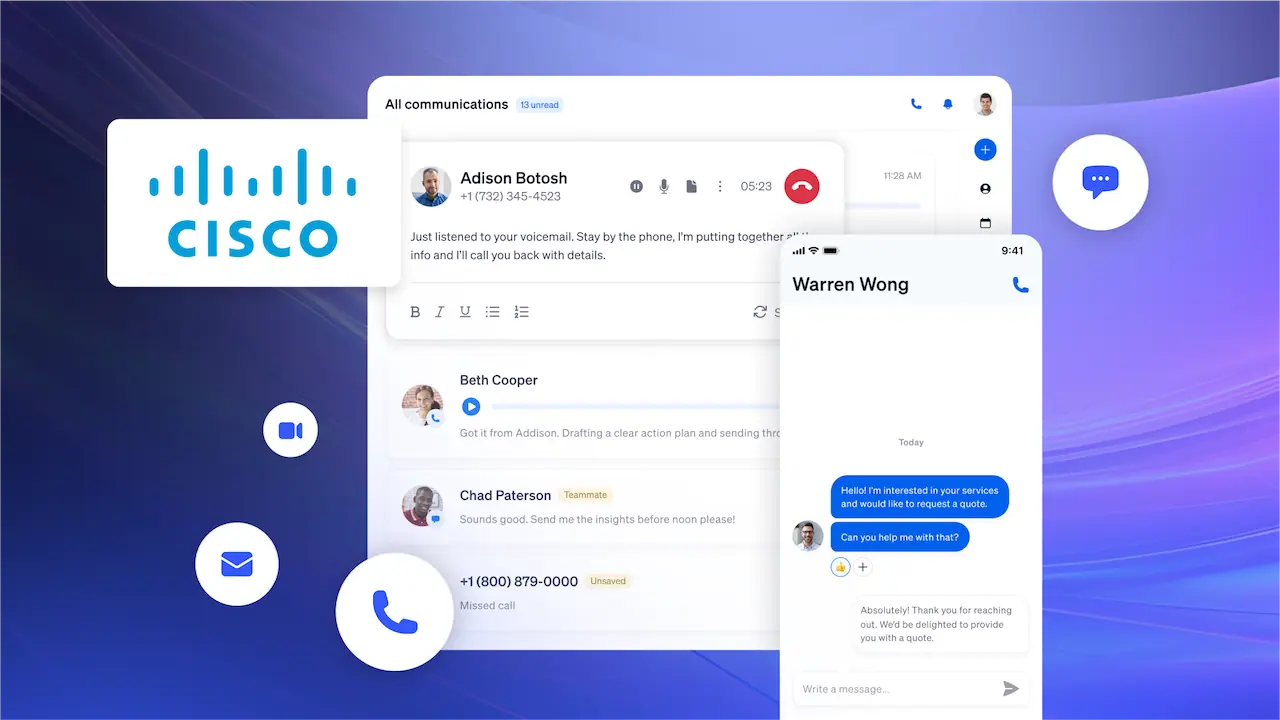Conversational artificial intelligence (AI) improves the self-service capabilities of traditional business chatbots, virtual assistants, and voice agents.
This technology automates customer service to the extent that customers get faster responses to simple questions, reducing wait times. When the questions become more complex, the conversational AI system smoothly hands them to a human agent.
The service delivery becomes almost instantaneous, optimizing key customer service metrics, including response time, accuracy, customer satisfaction, and problem-solving efficiency.
Modern businesses also integrate conversational AI chatbots with their CRMs to draw from customer history and offer a unique solution to each customer. Overall, this helps ensure human-like interactions while customers feel supported at all times, including during peak hours or on days off.
Where does your CX strategy stand with AI?
Take the AI Maturity assessment to get personalized recommendations on how to enhance your CX.
What Is Conversational AI?
Conversational AI is software that understands and responds to human conversation via text or voice using natural language processing (NLP). The machine learning (ML) capabilities of these tools help them to improve with every interaction.
NLP converts unstructured human language data into a format that machines can understand. It uses machine learning and natural language understanding to determine the relationship between words in a sentence. Other methods, such as part-of-speech tagging, ensure input text is understood and processed correctly.

Businesses apply conversational AI to their chatbots, intelligent virtual agents (IVAs), and voice assistants to deliver enjoyable conversational experiences that are fast, personalized, and easy. The intelligent automation of conversational AI solutions helps contact center teams meet and exceed customer expectations at scale, improving satisfaction and customer lifetime value.
Benefits of Conversational AI Solutions
These solutions expedite business in multiple ways. However, it’s not just about speed: Conversational AI also works to enhance the overall quality of the customer experience. There’s no trade-off between quality and speed; together, they help you manage customer interactions in different use cases at a much larger scale.
Here’s a detailed overview of why businesses prefer smart conversational AI technology.
24/7 customer service
A conversational AI tool keeps the customer-facing side of your business live at all times. Whether it’s a simple inquiry or an automated task, the software takes care of it even when your team is out of the office or simply resting at night.
Conversational AI lets you handle frequently asked questions (FAQs) without needing an agent to contribute their expertise.

Improved personalization
Most businesses integrate conversational IVAs with their CRMs and customer data platforms. This helps the AI solution create context — through past conversation history and user data — to improve customer engagement.
With this context, the AI agent can provide unique responses to customer queries, offering a more personalized experience. This saves customers from repeating what they have already conveyed and offers them an experience that’s fast and tailored to their needs.
Increased efficiency
As conversational AI solutions handle most of the simple queries that customers ask frequently, they free up time and mind space for service agents, letting them focus on complex issues that require more time to address.
With a reduced workload, human agents become more effective at managing complex issues that require expertise. They become more efficient and resolve complex queries faster, enhancing the customer experience (CX) end-to-end. Operational efficiency improves as problems are resolved more quickly.
Smarter data collection and insights
Conversational AI applications interact with customers at scale. They capture data about inquiries in real-time, which companies can analyze to identify opportunities to optimize their customer experience (CX) strategies.
For example, if you notice a question being frequently asked on your service channel, you can identify its root cause and address it accordingly. In such cases, you can prepare an FAQ guide or use simple in-product messaging to resolve feature-related inquiries.

Related: The Newbie’s Guide to Conversational AI Chatbots
Key Features of Conversational AI Solutions
When you’re seeking a conversational AI solution for your business, look for the following features to help you deliver an enjoyable CX to your users.
Contextual awareness
Contextual awareness enables you to personalize responses at various levels. Advanced contextual awareness can address queries like, “How much did I spend in New York last year?” or more complicated questions.
This personalization will provide your customers with an easy experience, making them more likely to return.

Seamless live agent takeover
Most conversational AI solutions facilitate live agent takeover to address customer queries that are too complex for the software to handle. The system can immediately assign conversations to default agents or ask a few questions to gather more context before passing conversations to relevant sales agents.
The transfer of the conversation is smooth, without recognizable delays, making the experience more seamless for customers.
Dialogue scripting
Conversational AI solutions include features such as dialogue scripting that create conversational flows. These flows feel natural and guide users toward a resolution.
This helps conversational AI agents better mimic human conversation and assist customers faster.
Omnichannel experience
Modern customers expect you to assist them on multiple channels. Whether they reach you through messaging apps, websites, or social media, they want a consistent experience.
Conversational AI lets you offer a similar experience across these apps while maintaining context from previous interactions.

Enterprise readiness
Companies expect their conversational AI solution to comply with industry regulations. They prefer solutions that maintain a level of security and data privacy when handling customer data.
This is especially crucial in the healthcare industry, where businesses must comply with Health Insurance Portability and Accountability Act (HIPAA) regulations. When you’re seeking a solution, check if it complies with regulations and standards in your sector.
Challenges of Using Conversational AI in CX
While conversational AI offers numerous benefits, it also presents challenges related to the customer experience.
Limited understanding of complex questions
Generative AI models might have become more advanced than they were a few years ago, but they still need to be able to effectively address complex customer questions.
Not all customer questions have objective answers. When such questions arise, conversational AI usually hands them over to a human agent who can advance the discussion.
Enterprise-grade security and privacy
Maintaining data security and privacy is crucial when dealing with your customers’ sensitive information. Your customer expects you to comply with relevant industry standards such as:
- General Data Protection Regulation
- HIPAA
- Sarbanes-Oxley Act
- System and Organization Controls
- California Consumer Privacy Act
Even when conversational AI solutions comply with these standards, some people still speculate and have second thoughts about using AI solutions.
Maintaining user trust
It takes a village to balance automation and human touch. Relying solely on conversational AI might undermine the CX when complex questions arise in a customer’s journey. AI might also fail to give a customer enough options.
This makes the experience frustrating and limiting for your customers.
Best Practices When Using Conversational AI in CX
When using an AI-powered conversational agent in your business on the CX side, here are a few best practices you should follow:
- Clearly define goals: Consider what you want to achieve with conversational AI. Do you want to automate answering FAQs? Do you want to assist prospects and lead them toward scheduling an appointment with your team? Or do you want something else?
- Train on quality data: Train the AI agent on a comprehensive dataset to understand user intent accurately. Give it industry- and product-specific data to help it comprehend and convey the nitty-gritty of your sector and answer questions accordingly.
- Set expectations: Keep customers informed that they’re interacting with a chatbot. To avoid adding to their frustration, always give them the option to connect with a human agent for urgent or complex queries.
- Prioritize user experience: Ensure you have supplied clear instructions to the conversational agent about responding to queries and performing sentiment analysis. To make a chatbot more engaging, it’s advisable to design its conversation flow to match an actual human’s.
Automate More Customer Interactions With Nextiva
Nextiva’s conversational AI platform keeps you available around the clock, supporting customers whenever they need it. This is especially helpful when your customers are based in different time zones.
You can easily engage with them through the chatbot without needing to recruit a customer support team to address inquiries during out-of-office hours. The cost savings occur naturally as bots handle simple inquiries and your agents focus on critical issues, enabling you to address more queries as a team.
Nextiva’s conversational AI solution seamlessly manages transitions between virtual agents and live agents. It keeps CX at the top and personalizes interactions by being contextually aware. When personalization becomes harder to maintain, it lets live agents take over.
Related: Top Chatbot Providers: Key Features, Uses, & Campaign Ideas
Is your CX falling short?
Assess and elevate your strategy with the Gartner® CX Maturity Model report.

















 Customer Experience
Customer Experience 












